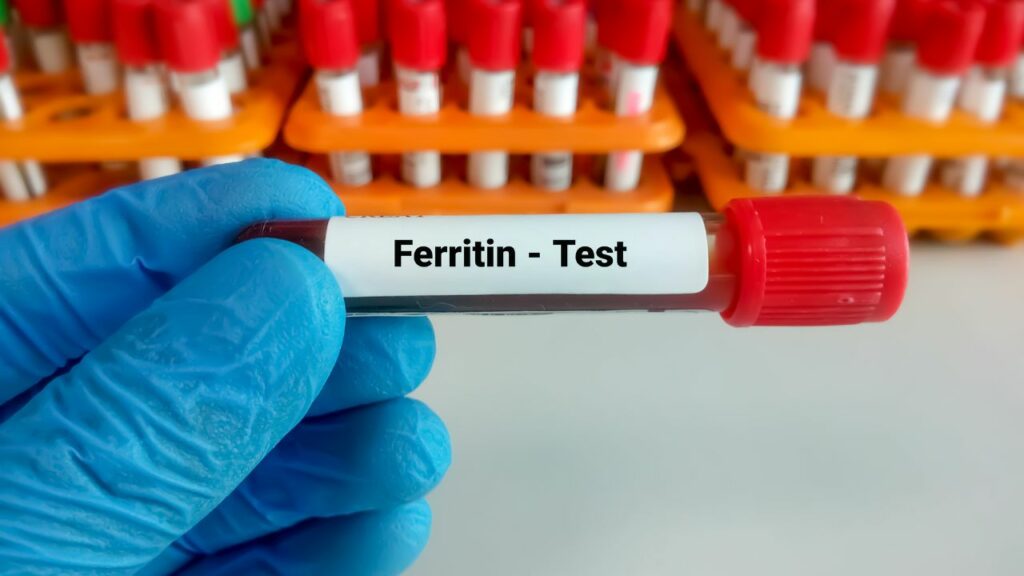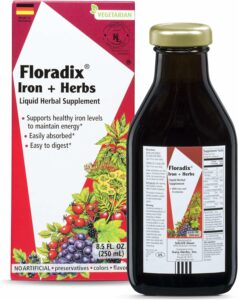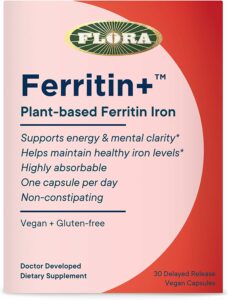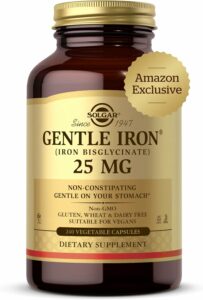Iron is an essential mineral that is required by the body to function properly. Without iron, we will not be able to survive. Iron can be found in numerous plant and animal sources, and we can also take supplements to get the daily recommended amount.
However, the amount of iron in your body is only half the equation. Ferritin also plays an important part in utilizing iron, and it is one of the things that are often overlooked or paid attention to.
Low ferritin levels can do a lot of harm to your body even if you know that you are taking in ample iron. As such, we will discuss how to increase ferritin levels with supplements and other means.
We will also be discussing the difference between iron and ferritin and how they function. Lastly, we will suggest some very good supplements to get your ferritin levels back to normal and maintain them.
Table of Contents
What is Iron?
Iron is a mineral essential for the body to function normally. Its main purpose is to transport oxygen to different organs by helping produce hemoglobin and myoglobin. It helps the body produce certain hormones.
Not only that, but iron also helps in promoting skin and hair health, boosting the immune system, improving sleep, promoting brain health, boosting energy levels, and many more.
Iron is also an essential nutrient for those who are pregnant or for those who are breastfeeding.
What Happens if I Am Iron Deficient?
Iron deficiency is a very serious condition that can lead to several complications. This often results in a condition called anemia, which is a state where there is a lack of healthy blood cells that will carry oxygen throughout the body tissues.
Those who are suffering from iron deficiencies or anemia can expect to experience some of the following symptoms:
- Fatigue
- Lethargy
- Pale Skin
- Headache and nausea
- Poor appetite
- Chest pains
- Poor nail health
- Cold hands and feet
How Much Iron Should I Be Getting?
The Recommended Daily Allowance (RDA) of iron will vary based on gender and age. Infants will generally need more iron as they need around 11 milligrams of iron per day to aid in their development.
For children, 7 to 10 milligrams of iron per day is required. This will increase to 15 to 18 milligrams from teenage years to adulthood.
Pregnant women, on the other hand, should hit targets of 27 milligrams of iron per day.
Vegetarians may also need to increase their intake of foods rich in iron or take supplements as most plant foods contain relatively lower numbers of this mineral than animal-based products.
It is also recommended for those suffering from certain medical conditions such as anemia, heavy menstrual periods, cancer, or any type of kidney disease.
In any case, it would still be best to consult with a medical professional about your daily iron needs and if you intend to take an iron supplement or other similar product.
How Can I Get Iron Naturally?
Iron can be found naturally in both plant and animal-based foods. There are also two kinds of iron that you can get depending on the source.
Haem iron is a type of iron that is more easily absorbed by the body. This type of iron can be found in foods such as:
- Beef
- Lamb
- Pork
- Chicken
- Turkey
- Eggs
- Seafood (e.g. salmon, tuna, sardines)
- Organ meats (e.g. kidney, liver)
On the other hand, non-haem iron is a type of iron that is not so easily absorbed by the body. However, you can absorb more of this nutrient by combining it with haem iron as well as foods that are high in Vitamin C.
Examples of foods high in non-haem iron include:
- Peppers
- Broccoli
- Legumes
- Papaya
- Kiwi
- Oranges
- Grapefruit
- Brussel sprouts
- Nuts and Seeds
- Tofu
- Spinach
There are also foods such as bread, breakfast cereal, and other products that have been fortified with iron.
Cooking in a cast iron skillet or pan can also increase your iron intake by as much as 16%. This is why many of those who are suffering from anemia are recommended to use these types of cookware when cooking and preparing food.
You can also get supplemental iron from supplements. There are many types of formulations available depending on the product that you are looking at.
As with all types of supplements or medication, it would be wise to check the label and consult with a doctor before consuming these types of products.
What is Ferritin?
Ferritin is a type of protein that has the main purpose of storing iron in your cells and then releasing it to the areas that need it if there is no longer enough supply.
Ideally, the ferritin levels in your body are proportional to the amount of iron that you have. The higher the iron levels, the higher the ferritin levels; the inverse is also true.
However, there are cases when ferritin levels are low even if tests show that iron levels in the body are high or normal. This can be due to a number of factors such as disease, inflammation, generics, or complications caused by surgery.
Elevated ferritin levels may be caused by excessive alcohol intake, liver-related complications, diabetes, hyperthyroidism, Still’s Disease, cancer, and obesity.
On the other hand, low ferritin levels despite relatively normal iron levels in the blood is called hypoferritinemia without anemia. This can be caused by factors such as gastrointestinal bleeding, celiac disease, some cancers, hemorrhoids, ulcers, and various others.
A ferritin test along with other tests like a CBC are required to check if your iron and ferritin levels are normal for your age and gender.
Side Effects of Ferritin Supplements
Common side effects of taking ferritin supplements include some constipation, diarrhea, or other forms of gastrointestinal discomfort. Taking plant-based ferritin will result in fewer complications like these in most cases.
More severe side effects would include body or chest pains, dizziness, headaches, increased heart rate, tingling of the hands and feet, and cramping.
These side effects, however, are very rare.
You should also take caution and take only what is recommended by the doctor. In some cases, iron overdose can occur. This can result in conditions such as hyperventilation, irregular heart rates, clammy skin, and even seizures.
As always, it is always good to consult with a physician or similar professional before taking any kind of supplement and to stop taking supplements or medication if any severe side effects occur.
Top 3 Picks To Increase Ferritin Levels with Supplements
If you are suffering from low ferritin levels or if you simply want to improve or maintain your ferritin numbers, then it is suggested that you take supplements.
There are several types of ferritin supplements that you can find on the market today, containing various formulations and combinations of iron, ferritin, and other minerals and nutrients.
Here are three of the best supplements to increase ferritin levels that we have found based on reviews.
1. Floradix Iron + Herbs Liquid Herbal Supplement
Floradix Iron + Herbs Liquid Herbal Supplement contains a proprietary blend of different herbs, plants, and extracts along with over 50% of the recommended iron RDA.
The product uses ferrous gluconate which makes it easily digestible and absorbable by the body. The product is in liquid form so there are no hard-to-swallow pills or tablets involved.
Floradix Iron + Herbs Liquid Herbal Supplement is made with vegan-friendly products, does not contain any dairy, kosher, and is guaranteed to be non-GMO.
Pros:
- Contains Vitamins B and C
- Easy to consume
- Iron gluconate is easily absorbed by the body
Cons:
- Contains sugar
- Has an unpleasant aftertaste
2. Flora Ferritin+ Plant-based Ferritin Iron
Flora Ferritin+ Plant-Based Ferritin Iron comes in capsule form, providing 111% RDA of iron derived from peas. The vegan capsules are formulated to be slow-releasing so they can be absorbed better in the intestinal tract.
The peas used are organic and natural, and the product itself was formulated to cause fewer side effects than other brands. This makes the product good for those who have low ferritin levels but are afraid of possible complications.
In addition to these benefits, Flora Ferritin+ Plant-Based Ferritin Iron is also gluten-free, making it safe for those allergic to this type of protein.
Pros:
- Provides over 100% of iron RDA
- Plant-based ferritin
- Has fewer side effects than other brands
Cons:
- Packaging of individual capsules is difficult to open
- Can cause some constipation in others
3. Solgar Gentle Iron
Solgar Gentle Iron contains one of the highest doses of iron, providing 25 milligrams of iron which represents over 120% of the recommended daily requirement of iron in the body.
The iron contained in each vegetable capsule is in iron bis-glycinate chelate form, which has higher bioavailability than the more common ferrous sulfate.
In addition, Solgar Gentle Iron is formulated to have fewer side effects, and is also made to be vegan-friendly, kosher, and free from allergens such as gluten, wheat, soy, sugar, and other artificial ingredients.
Pros:
- 100% vegan ingredients
- One of the best forms of iron available
- Free of most allergens
Cons:
- Constipation can still be an issue
- Capsules are a bit too large








